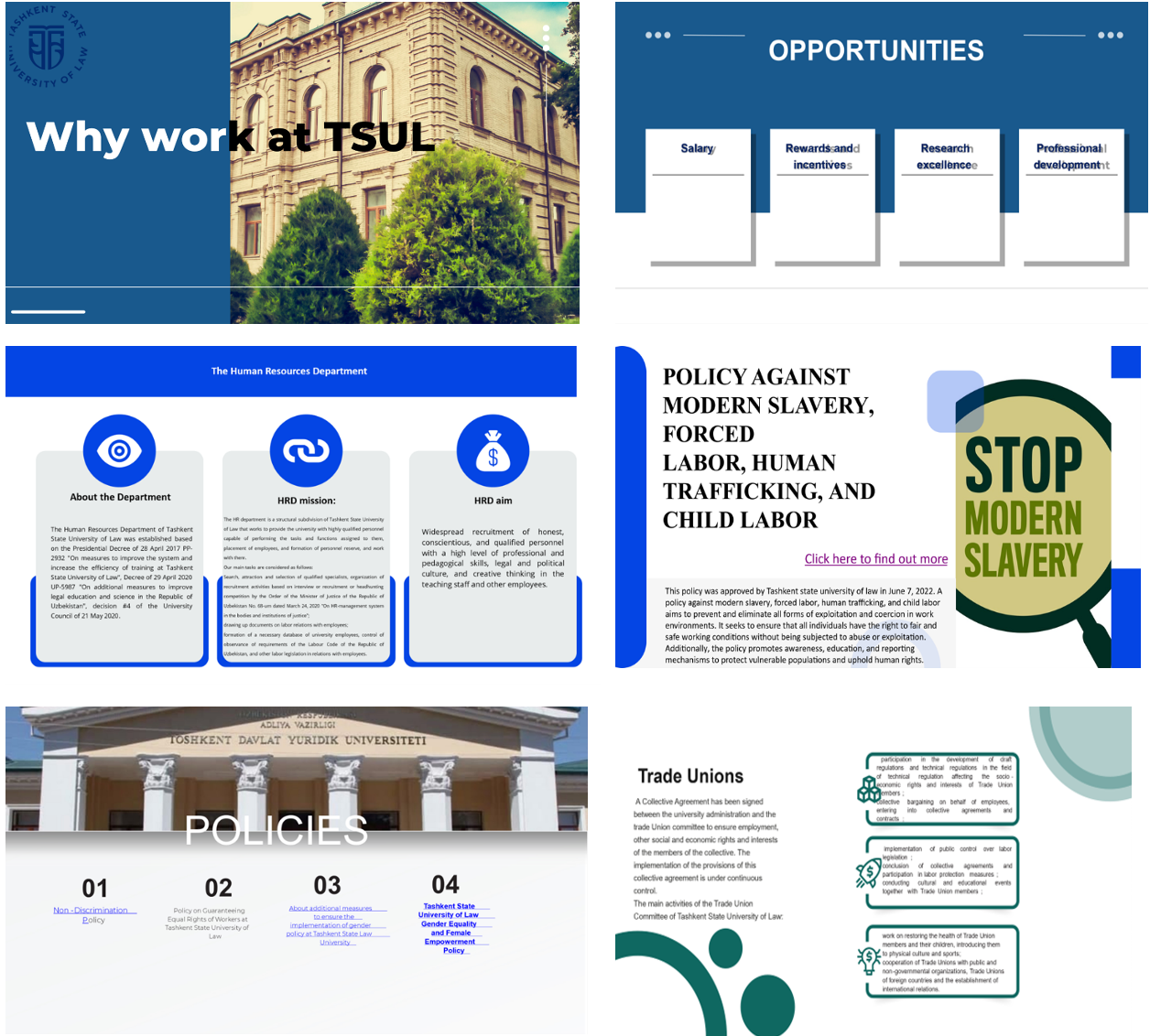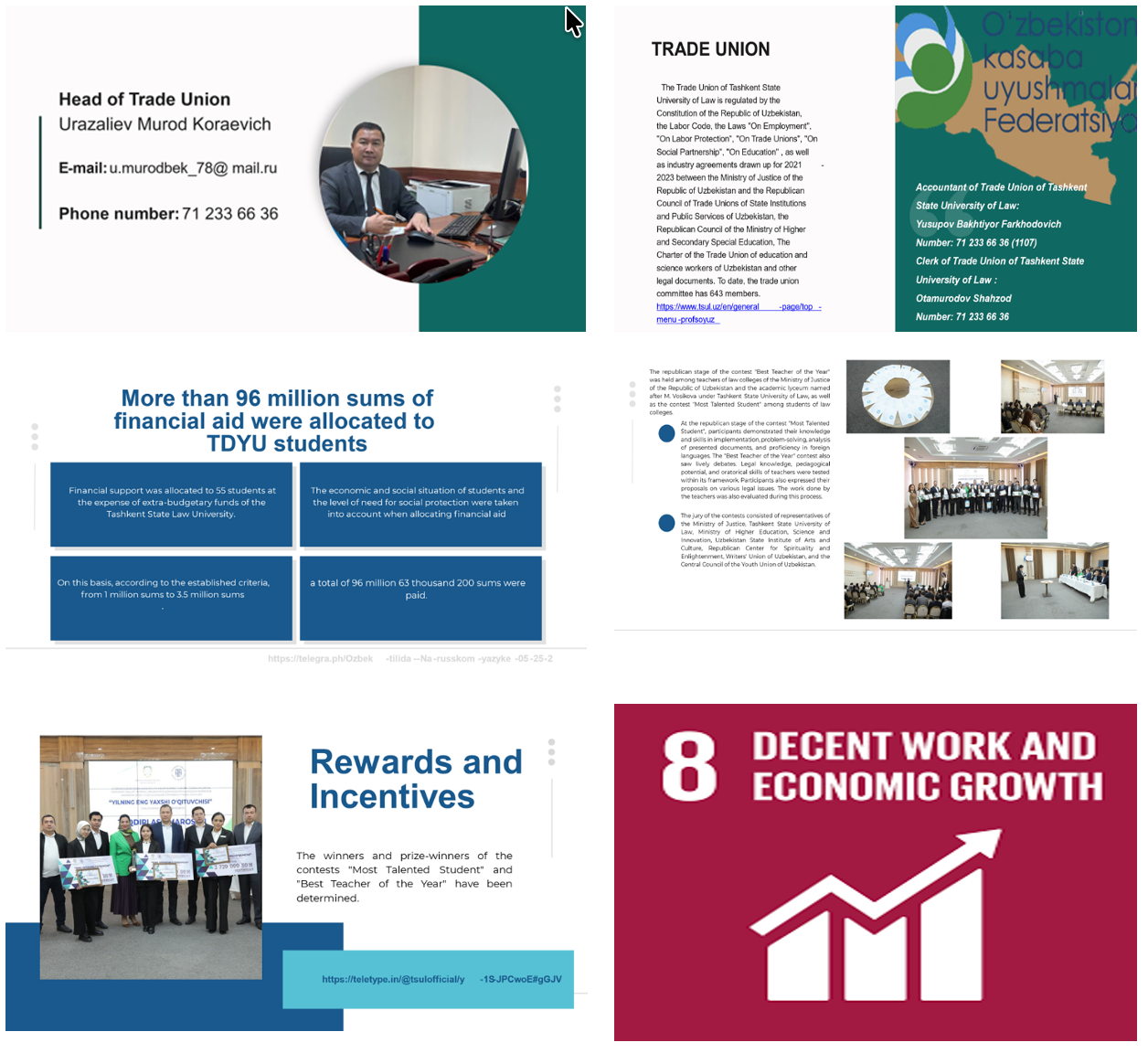Xaridlar
E'lon I-yarim yillik hisoboti 2022-yil I-chorak hisoboti 2022-yil II-chorak hisoboti 2022-yil III-chorak hisoboti 2023-yil I-chorak hisoboti 2023-yil II-chorak hisoboti 2023-yil III chorak hisoboti 2025 - yil I-chorak hisoboti 2025 - yil II-chorak hisoboti 2025-yil III-chorak hisoboti 2024-yil moliyaviy hisobot 2023-yil moliyaviy hisobot 2021-yil moliyaviy hisobot 2025-yil IV-chorak hisobotiKadr
VakansiyalarBog‘lanish
Telefon ma’lumotnomaChet elda amaliyot va qisqa muddatli kurslar
Professor-o‘qituvchilar va xodimlar uchun stajirovkalar Doktorant va mustaqil izlanuvchilar uchun stajirovkalar Yozgi va qishki maktablarMilliy va xalqaro NNTlar, xayriya tashkilotlari va boshqa tuzilmalar bilan xalqaro hamkorlik
2024-yil 1-2-chorak4. SIFATLI TA'LIM
Maktab o‘quvchilari bilan ishlash5. GENDER TENGLIGI
Ilm-fanda ayollar
- Rektor murojaati
- Maqsad va qadriyatlar
- Hisobotlar va taqdimotlar
- Logotip va xos uslub
- Muzey
- Universitetning ustuvor yo‘nalishi
- Universitet rivojlanishining strategik yo‘nalishlari
- Ekologik barqarorlik
- Yashil universitet
- Universitet tasvirlari
- Fakultetlar
- Boshqarmalar
- Markazlar
- Bo'limlar
- Kafedralar
- Yuridik klinika
- Talabalar turar joylari
- TDYU huzuridagi akademik litseylar
- Kengash
- Rektor
- Prorektorlar
- Rahbariyat qabuli
- Murojaatlar tahlili
- Litsenziya va akkreditatsiyalar
- Nizom
- Asosiy normativ-huquqiy hujjatlar
- Lokal hujjatlar
- Korrupsiyaga qarshi kurashish
- Raqamlar va ma’lumotlar
- Reytinglardagi o‘rinlar
- E'lon
- I-yarim yillik hisoboti
- 2022-yil I-chorak hisoboti
- 2022-yil II-chorak hisoboti
- 2022-yil III-chorak hisoboti
- 2023-yil I-chorak hisoboti
- 2023-yil II-chorak hisoboti
- 2023-yil III chorak hisoboti
- 2025 - yil I-chorak hisoboti
- 2025 - yil II-chorak hisoboti
- 2025-yil III-chorak hisoboti
- 2024-yil moliyaviy hisobot
- 2023-yil moliyaviy hisobot
- 2021-yil moliyaviy hisobot
- 2025-yil IV-chorak hisoboti
- Vakansiyalar
- Telefon ma’lumotnoma
Universitet
Universitet haqida
Universitet
Tarkibiy tuzilma
Boshqaruv organlari
Murojaatlar
Rasmiy hujjatlar
Ochiq ma’lumotlar
Yutuqlar
Xaridlar
Kadr
Bog‘lanish
Stakeholder engagement policy
- Bitiruvchilar ro‘yxati
- Bizning bitiruvchilar
Ta'lim
Bakalavriat
Magistratura mutaxassisliklari
Stipendiya va grantlar
Elektron kutubxona
Mashg‘ulotlar jadvali
Masofaviy ta'lim
Treninglar va mayner kurslar
Yakuniy davlat attestatsiyalari
Yuridik klinika
Street Law
O'quv dastur
O'quv reja
Malaka talablari
Bandlik va karyera
Xalqaro standartlar boʻyicha professional oʻqitish markazi
Aholi uchun ekspert maslahatlari
TDYU ekspertlari
Bitiruvchilar
Stipendiya va grantlar
Elektron kutubxona
Mashg‘ulotlar jadvali
Masofaviy ta'lim
Treninglar va mayner kurslar
Yakuniy davlat attestatsiyalari
Yuridik klinika
Street Law
O'quv dastur
O'quv reja
Malaka talablari
Bandlik va karyera
Xalqaro standartlar boʻyicha professional oʻqitish markazi
Aholi uchun ekspert maslahatlari
TDYU ekspertlari
Bitiruvchilar
Mashg‘ulotlar jadvali
Masofaviy ta'lim
Treninglar va mayner kurslar
Yakuniy davlat attestatsiyalari
Yuridik klinika
Street Law
O'quv dastur
O'quv reja
Malaka talablari
Bandlik va karyera
Xalqaro standartlar boʻyicha professional oʻqitish markazi
Aholi uchun ekspert maslahatlari
TDYU ekspertlari
Bitiruvchilar
Treninglar va mayner kurslar
Yakuniy davlat attestatsiyalari
Yuridik klinika
Street Law
O'quv dastur
O'quv reja
Malaka talablari
Bandlik va karyera
Xalqaro standartlar boʻyicha professional oʻqitish markazi
Aholi uchun ekspert maslahatlari
TDYU ekspertlari
Bitiruvchilar
Yuridik klinika
Street Law
O'quv dastur
O'quv reja
Malaka talablari
Bandlik va karyera
Xalqaro standartlar boʻyicha professional oʻqitish markazi
Aholi uchun ekspert maslahatlari
TDYU ekspertlari
Bitiruvchilar
O'quv dastur
O'quv reja
Malaka talablari
Bandlik va karyera
Xalqaro standartlar boʻyicha professional oʻqitish markazi
Aholi uchun ekspert maslahatlari
TDYU ekspertlari
Bitiruvchilar
Malaka talablari
Bandlik va karyera
Xalqaro standartlar boʻyicha professional oʻqitish markazi
Aholi uchun ekspert maslahatlari
TDYU ekspertlari
Bitiruvchilar
Xalqaro standartlar boʻyicha professional oʻqitish markazi
Aholi uchun ekspert maslahatlari
TDYU ekspertlari
Bitiruvchilar
TDYU ekspertlari
Bitiruvchilar
- Ilmiy maktablar faoliyati bo‘yicha ma'lumotnoma
- Umumiy ma’lumot
- Reytinglarda ishtirok
- Reytinglar OAVda
- Imtihon natijalari
- Savollar ro‘yxati
- Naoshi Sugiyama
Ilmiy-innovatsion faoliyat
Ilmiy faoliyat
Ilmiy kengashlar
Ilmiy maktablar
Ilmiy maktablar
Ilmiy nashrlar
Yosh olimlar kengashi
Ilmiy fond
Akademik innovatsiyalar fondi
Legal Tech laboratoriyasi
Ilmiy-innovatsion ishlanmalarni tijoratlashtirish
Huquqiy tashabbuslar
TDYU xalqaro reytinglarda
Ilmiy fond
Akademik innovatsiyalar fondi
Legal Tech laboratoriyasi
Ilmiy-innovatsion ishlanmalarni tijoratlashtirish
Huquqiy tashabbuslar
TDYU xalqaro reytinglarda
Legal Tech laboratoriyasi
Ilmiy-innovatsion ishlanmalarni tijoratlashtirish
Huquqiy tashabbuslar
TDYU xalqaro reytinglarda
Huquqiy tashabbuslar
TDYU xalqaro reytinglarda
Malakaviy imtixonlar
Ilmiy ishlanmalar natijalari
Xizmatlar
“Central Asian Legal Research Fellowship” almashinuv dasturi
Davlat ilmiy-texnik dasturlari doirasidagi grantlar
Patentlar
Akademik halollik va tadqiqot etikasi kodeksi
Konferentsiya materiallari
Maqsadli doktorantura va tayanch doktorantura
Xizmatlar
“Central Asian Legal Research Fellowship” almashinuv dasturi
Davlat ilmiy-texnik dasturlari doirasidagi grantlar
Patentlar
Akademik halollik va tadqiqot etikasi kodeksi
Konferentsiya materiallari
Maqsadli doktorantura va tayanch doktorantura
Davlat ilmiy-texnik dasturlari doirasidagi grantlar
Patentlar
Akademik halollik va tadqiqot etikasi kodeksi
Konferentsiya materiallari
Maqsadli doktorantura va tayanch doktorantura
Akademik halollik va tadqiqot etikasi kodeksi
Konferentsiya materiallari
Maqsadli doktorantura va tayanch doktorantura
Maqsadli doktorantura va tayanch doktorantura
Doktorantlar
Faxriy professorlar
- Hamkor xorijiy universitetlar
- Hamkor xorijiy tashkilotlar
- Xalqaro assotsiatsiyalarga a'zolik
- Xalqaro olimpiada va tanlovlar
- Xorijiy professorlar
- Xorijiy xizmat safarlari
- Qo'shma ta'lim dasturlari
- University Foundation Program o‘quv kursi
- Talabalar almashinuvi
- Professor-o‘qituvchilar almashinuvi
- Qo‘shma fakultetlar
- Xorijiy stajirovka hisobotlari — 2023
- Xorijiy stajirovka hisobotlari — 2024
- Xorijiy stajirovka hisobotlari — 2025
- Xalqaro konferensiya, seminar va davra suhbatlari
- Xalqaro ilmiy loyiha va grantlar
- Ekspertlar kengashi (vatandoshlar)
- Xalqaro stipendiyalar
- Hamkor OTMlar stipendiyalari
- Professor-o‘qituvchilar va xodimlar uchun stajirovkalar
- Doktorant va mustaqil izlanuvchilar uchun stajirovkalar
- Yozgi va qishki maktablar
- 2024-yil 1-2-chorak
Xalqaro faoliyat
Xalqaro aloqalar
Akademik mobillik
Ilmiy loyihalar
Chet elda amaliyot va qisqa muddatli kurslar
Markaziy Osiyo talabalar kongressi
Milliy va xalqaro NNTlar, xayriya tashkilotlari va boshqa tuzilmalar bilan xalqaro hamkorlik
Talabalar hayoti
Ijtimoiy faollikni rag'batlantirish
Talabalar birlashmalari
Ijodiy studiya va klublar
Talabalar sport klublari
Ilmiy maktablar va to‘garaklar
Talabalar festivali
Stipendiyalar
Olimpiadalar
Talabalar turar joyi
Tibbiy markaz
Ovqatlanish joylari
Kitob do’koni
Yoshlar ittifoqi TDYU boshlang’ich tashkiloti
Yoshlar Parlamenti
Ma'naviyat
Ekofaol talabalar
Ijtimoiy faollik indeksi
Faol talabalar reyestri
Kelajakka qadam
Ijodiy studiya va klublar
Talabalar sport klublari
Ilmiy maktablar va to‘garaklar
Talabalar festivali
Stipendiyalar
Olimpiadalar
Talabalar turar joyi
Tibbiy markaz
Ovqatlanish joylari
Kitob do’koni
Yoshlar ittifoqi TDYU boshlang’ich tashkiloti
Yoshlar Parlamenti
Ma'naviyat
Ekofaol talabalar
Ijtimoiy faollik indeksi
Faol talabalar reyestri
Kelajakka qadam
Ilmiy maktablar va to‘garaklar
Talabalar festivali
Stipendiyalar
Olimpiadalar
Talabalar turar joyi
Tibbiy markaz
Ovqatlanish joylari
Kitob do’koni
Yoshlar ittifoqi TDYU boshlang’ich tashkiloti
Yoshlar Parlamenti
Ma'naviyat
Ekofaol talabalar
Ijtimoiy faollik indeksi
Faol talabalar reyestri
Kelajakka qadam
Stipendiyalar
Olimpiadalar
Talabalar turar joyi
Tibbiy markaz
Ovqatlanish joylari
Kitob do’koni
Yoshlar ittifoqi TDYU boshlang’ich tashkiloti
Yoshlar Parlamenti
Ma'naviyat
Ekofaol talabalar
Ijtimoiy faollik indeksi
Faol talabalar reyestri
Kelajakka qadam
Talabalar turar joyi
Tibbiy markaz
Ovqatlanish joylari
Kitob do’koni
Yoshlar ittifoqi TDYU boshlang’ich tashkiloti
Yoshlar Parlamenti
Ma'naviyat
Ekofaol talabalar
Ijtimoiy faollik indeksi
Faol talabalar reyestri
Kelajakka qadam
Ovqatlanish joylari
Kitob do’koni
Yoshlar ittifoqi TDYU boshlang’ich tashkiloti
Yoshlar Parlamenti
Ma'naviyat
Ekofaol talabalar
Ijtimoiy faollik indeksi
Faol talabalar reyestri
Kelajakka qadam
Yoshlar ittifoqi TDYU boshlang’ich tashkiloti
Yoshlar Parlamenti
Ma'naviyat
Ekofaol talabalar
Ijtimoiy faollik indeksi
Faol talabalar reyestri
Kelajakka qadam
Ma'naviyat
Ekofaol talabalar
Ijtimoiy faollik indeksi
Faol talabalar reyestri
Kelajakka qadam
Ijtimoiy faollik indeksi
Faol talabalar reyestri
Kelajakka qadam
Kelajakka qadam
Qabul 2025
Qabul komissiyasi faoliyati
Bakalavriat taʼlim yo‘nalishi
Magistratura mutaxassisligi
Qo‘shma taʼlim dasturlari asosida o‘qishga qabul qilish
Yuridik texnikum bitiruvchilarini o‘qishga qabul qilish
Xorijiy fuqarolarni o‘qishga qabul qilish
Qabul jarayoniga oid eʼlonlar
Yuridik litsey bitiruvchilarini o‘qishga qabul qilish
Talabalar o'qishini ko'chirish va qayta tiklash masalalari
Ko'zi ojiz abituriyentlarni o'qishga qabul qilish
Iqtisodiyot tarmoqlarida kamida besh yil ish stajiga ega bo‘lgan fuqarolarni o‘qishga qabul qilish bo‘yicha o‘tkazilgan suhbat natijalari
Toshkent davlat yuridik universitetiga 2025/2026-o'quv yili uchun tabaqalashtirilgan to'lov-kontrakt miqdorlari
Magistratura mutaxassisligi
Qo‘shma taʼlim dasturlari asosida o‘qishga qabul qilish
Yuridik texnikum bitiruvchilarini o‘qishga qabul qilish
Xorijiy fuqarolarni o‘qishga qabul qilish
Qabul jarayoniga oid eʼlonlar
Yuridik litsey bitiruvchilarini o‘qishga qabul qilish
Talabalar o'qishini ko'chirish va qayta tiklash masalalari
Ko'zi ojiz abituriyentlarni o'qishga qabul qilish
Iqtisodiyot tarmoqlarida kamida besh yil ish stajiga ega bo‘lgan fuqarolarni o‘qishga qabul qilish bo‘yicha o‘tkazilgan suhbat natijalari
Toshkent davlat yuridik universitetiga 2025/2026-o'quv yili uchun tabaqalashtirilgan to'lov-kontrakt miqdorlari
Yuridik texnikum bitiruvchilarini o‘qishga qabul qilish
Xorijiy fuqarolarni o‘qishga qabul qilish
Qabul jarayoniga oid eʼlonlar
Yuridik litsey bitiruvchilarini o‘qishga qabul qilish
Talabalar o'qishini ko'chirish va qayta tiklash masalalari
Ko'zi ojiz abituriyentlarni o'qishga qabul qilish
Iqtisodiyot tarmoqlarida kamida besh yil ish stajiga ega bo‘lgan fuqarolarni o‘qishga qabul qilish bo‘yicha o‘tkazilgan suhbat natijalari
Toshkent davlat yuridik universitetiga 2025/2026-o'quv yili uchun tabaqalashtirilgan to'lov-kontrakt miqdorlari
Qabul jarayoniga oid eʼlonlar
Yuridik litsey bitiruvchilarini o‘qishga qabul qilish
Talabalar o'qishini ko'chirish va qayta tiklash masalalari
Ko'zi ojiz abituriyentlarni o'qishga qabul qilish
Iqtisodiyot tarmoqlarida kamida besh yil ish stajiga ega bo‘lgan fuqarolarni o‘qishga qabul qilish bo‘yicha o‘tkazilgan suhbat natijalari
Toshkent davlat yuridik universitetiga 2025/2026-o'quv yili uchun tabaqalashtirilgan to'lov-kontrakt miqdorlari
Talabalar o'qishini ko'chirish va qayta tiklash masalalari
Ko'zi ojiz abituriyentlarni o'qishga qabul qilish
Iqtisodiyot tarmoqlarida kamida besh yil ish stajiga ega bo‘lgan fuqarolarni o‘qishga qabul qilish bo‘yicha o‘tkazilgan suhbat natijalari
Toshkent davlat yuridik universitetiga 2025/2026-o'quv yili uchun tabaqalashtirilgan to'lov-kontrakt miqdorlari
Iqtisodiyot tarmoqlarida kamida besh yil ish stajiga ega bo‘lgan fuqarolarni o‘qishga qabul qilish bo‘yicha o‘tkazilgan suhbat natijalari
Toshkent davlat yuridik universitetiga 2025/2026-o'quv yili uchun tabaqalashtirilgan to'lov-kontrakt miqdorlari
- Maktab o‘quvchilari bilan ishlash
- Ilm-fanda ayollar
SDG
1. QASHSHOQLIKKA BARHAM BERISH
2. OCHLIKKA BARHAM BERISH
3. SOG’LIQ VA FAROVONLIK
4. SIFATLI TA'LIM
3. SOG’LIQ VA FAROVONLIK
4. SIFATLI TA'LIM
5. GENDER TENGLIGI
6. TOZA SUV VA SANITARIYA
7. ARZON VA TOZA ENERGIYA
8. MUNOSIB ISH O‘RINLARI VA IQTISODIY O‘SISH
9. SANOATLASHTIRISH, INNOVATSIYA VA INFRASTRUKTURA
10. TENGSIZLIKNI KAMAYTIRISH
11. BARQAROR SHAHARLAR VA AHOLI YASHASH JOYLARI
12. SAMARALI ISTE’MOL VA ISHLAB CHIQARISH
13. IQLIM O‘ZGARISHIGA QARSHI KURASHISH
14. DENGIZ EKOTIZMLARINI ASRASH
15. QURUQLIKDAGI EKOTIZIMLARNI ASRASH
16. TINCHLIK, ADOLAT VA SAMARALI BOSHQARUV
17. BARQAROR RIVOJLANISH YO‘LIDA HAMKORLIK
8. MUNOSIB ISH O‘RINLARI VA IQTISODIY O‘SISH
9. SANOATLASHTIRISH, INNOVATSIYA VA INFRASTRUKTURA
10. TENGSIZLIKNI KAMAYTIRISH
11. BARQAROR SHAHARLAR VA AHOLI YASHASH JOYLARI
12. SAMARALI ISTE’MOL VA ISHLAB CHIQARISH
13. IQLIM O‘ZGARISHIGA QARSHI KURASHISH
14. DENGIZ EKOTIZMLARINI ASRASH
15. QURUQLIKDAGI EKOTIZIMLARNI ASRASH
16. TINCHLIK, ADOLAT VA SAMARALI BOSHQARUV
17. BARQAROR RIVOJLANISH YO‘LIDA HAMKORLIK
10. TENGSIZLIKNI KAMAYTIRISH
11. BARQAROR SHAHARLAR VA AHOLI YASHASH JOYLARI
12. SAMARALI ISTE’MOL VA ISHLAB CHIQARISH
13. IQLIM O‘ZGARISHIGA QARSHI KURASHISH
14. DENGIZ EKOTIZMLARINI ASRASH
15. QURUQLIKDAGI EKOTIZIMLARNI ASRASH
16. TINCHLIK, ADOLAT VA SAMARALI BOSHQARUV
17. BARQAROR RIVOJLANISH YO‘LIDA HAMKORLIK
12. SAMARALI ISTE’MOL VA ISHLAB CHIQARISH
13. IQLIM O‘ZGARISHIGA QARSHI KURASHISH
14. DENGIZ EKOTIZMLARINI ASRASH
15. QURUQLIKDAGI EKOTIZIMLARNI ASRASH
16. TINCHLIK, ADOLAT VA SAMARALI BOSHQARUV
17. BARQAROR RIVOJLANISH YO‘LIDA HAMKORLIK
14. DENGIZ EKOTIZMLARINI ASRASH
15. QURUQLIKDAGI EKOTIZIMLARNI ASRASH
16. TINCHLIK, ADOLAT VA SAMARALI BOSHQARUV
17. BARQAROR RIVOJLANISH YO‘LIDA HAMKORLIK
16. TINCHLIK, ADOLAT VA SAMARALI BOSHQARUV
17. BARQAROR RIVOJLANISH YO‘LIDA HAMKORLIK

- Elektron kutubxona
- E-universitet
- Masofaviy ta'lim
- Mashg‘ulotlar jadvali
- Xorijiy talabalarga
- Stipendiya va grantlar
- Talabalarga xizmat ko'rsatish markazi
- Street Law
- Akademik mobillik
- Xorijiy professorlar
- Treninglar va mayner kurslar
- Klub va to‘garaklar, mahorat darslari va festivallar
- Murojat qilish
- Korruptsiyaga qarshi kurash usullari
- Ta’lim grantlari
- Toshkent davlat yuridik universitetida kiyinish tartibi
Talabalar uchun

SDG 8
Institutional Position and Mechanisms
In alignment with Sustainable Development Goal 8 “Decent Work and Economic Growth”, the Tashkent State University of Law (TSUL) actively promotes inclusive and sustainable economic growth, productive employment, and decent work for all. TSUL has formal mechanisms to ensure fair remuneration and decent work conditions for all staff (academic and non-academic).
Collective Agreement (2023-2026)
On February 28, 2024, TSUL concluded a 17-chapter Collective Agreement for 2023-2026, designed to safeguard the socio-economic rights and interests of all staff members. This agreement was signed between the University Administration and the Trade Union Committee, ensuring fair labour practices, the protection of employee welfare, and compliance with national labour standards.
The implementation of the Collective Agreement is conducted under continuous oversight by a joint commission, which includes equal representatives from both the Trade Union Committee and the Employer, alongside the Chairman of the Honorary Council of TSUL. This mechanism guarantees that staff salaries, benefits, and working conditions remain compliant with Uzbekistan’s Labour Code and exceed the national minimum wage, which serves as a proxy indicator of the local living wage in the absence of an officially defined rate. TSUL ensures that all university employees receive remuneration above the national poverty threshold and the minimum wage level established by the government, thereby fulfilling the intent of SDG 8.
Based on the Collective Agreement and joint oversight, TSUL ensures that all staff and faculty are paid at least the equivalent of a living wage, meaning salaries are never below the national minimum or the local poverty level for a family of four. Pay levels are regularly reviewed to maintain compliance.
TSUL Remuneration and Benefits Policy
Uzbekistan National Minimum Wage for 2025 |
| 7,222 UZS per hour |
| 1,271,000 UZS monthly |
| 288,864 UZS weekly |
| 57,773 UZS daily |
Tashkent State University of Law (TSUL) ensures that all staff and faculty receive salaries aligned with national living wage standards as established by the government. The university follows the National Single Pay Spine system, which guarantees fair, consistent, and equitable pay based on skills, experience, and contribution.
In addition to the base salary, TSUL implements financial incentive schemes approved by the Rector’s Order No. 08-108 (June 16, 2020), allowing fixed monthly allowances of up to 200% of the salary for professors and teachers and up to 300% for management, scientific, educational, technical, and service staff.
Furthermore, in accordance with Presidential Decree No. PF-6260 (July 13, 2021), graduates from top 300 international universities and holders of advanced academic degrees receive additional monthly allowances equivalent to 20–75 times the base calculation amount, depending on the ranking of the institution and the qualification obtained.
These measures collectively ensure that all employees are compensated above the national minimum and living wage levels, promoting fair and decent working conditions.
APPENDIX No. 1
The amount of additional allowances paid to the official salary of young specialists employed in state bodies, organizations, and institutions who have completed their studies (bachelor’s or master’s degrees) or obtained a scientific degree (PhD or an equivalent scientific degree) from foreign higher education institutions included in the top 300 list of reputable international ranking organizations
Place in the international ranking | The amount of allowances (equal to the base calculation amount) | ||
|---|---|---|---|
Undergraduate | Postgraduate | Academic degree (PhD and equivalent other degree) | |
1 — 100 | 30 | 40 | 75 |
101 — 300 | 20 | 30 | 60 |
For reference, the base calculation amount as of 2025 is set at 412,000 UZS, in accordance with the Decree of the President of the Republic of Uzbekistan No. DP-91 dated June 2, 2025.
 | TSUL Gender Equality and Staff Welfare Policy |
TSUL fosters an inclusive institutional culture that embraces diversity and actively supports underrepresented groups. The university ensures that recruitment, promotion, and employment decisions are made solely on the basis of individual merit, without discrimination on grounds such as gender, age, ethnicity, race, religion, marital status, social background, or beliefs.
Specifically, in alignment with the Constitution of the Republic of Uzbekistan, the Labour Code of the Republic of Uzbekistan and Law of the Republic of Uzbekistan No. LRU-562 “On guarantees with respect to equal rights and opportunities for women and men” dated September 2, 2019, TSUL upholds gender equality across all aspects of employment, including remuneration, bonuses, social protection, and working conditions.
The Tashkent State University of Law is firmly committed to maintaining a workplace free from discrimination and sexual harassment. A comprehensive set of internal regulations, including the Equality, Diversity, and Inclusion Policy, alongside the Policy on Guaranteeing Equal Rights of Workers, Gender Equality Policy, Policy Against Modern Slavery, Forced Labor, Human Trafficking, and Child Labor, Gender Equality and Female Empowerment Policy, reinforces this commitment and further promotes equal pay, decent work, and professional growth opportunities for all employees.
The university also adheres to the principles of ILO Convention No. 100, ensuring equal remuneration for work of equal value, while its Code of Conduct underscores zero tolerance toward discrimination or harassment in any form.
TSUL also supports career development and employability through its Career Education Program, which assists both current students and alumni in designing meaningful professional paths. The program connects students with employers, facilitates internships and professional placements, and helps them explore future opportunities in an evolving global job market.


Does your university as a body recognise unions for all, including women & international staff?
Does your university as a body measure/track pay scale gender equity?
Does your university as a body have a process for employees to appeal on employee rights and/or pay?

